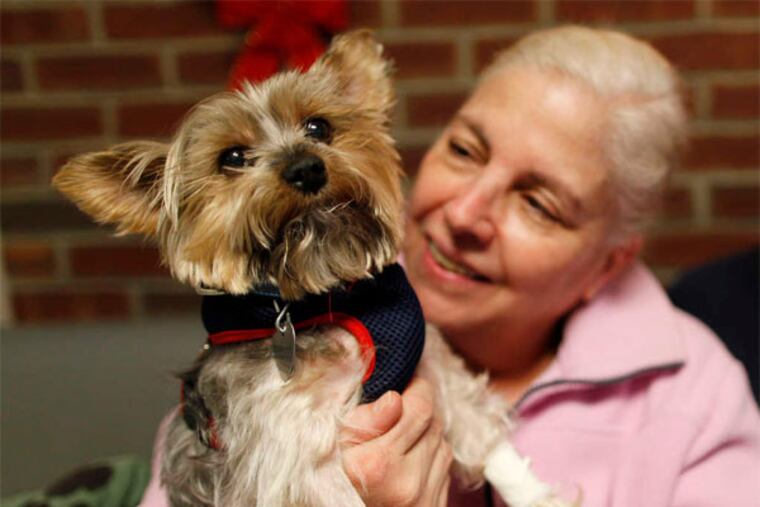Holidays can be an unhealthy time for pets
Maximus Golson nearly died Saturday morning. "He's energetic," said Antwin Golson, who raised the 18-month-old miniature Doberman pinscher from a puppy. So on Friday, when he noticed Max lying listlessly in a corner, "I knew something was wrong."

Maximus Golson nearly died Saturday morning.
"He's energetic," said Antwin Golson, who raised the 18-month-old miniature Doberman pinscher from a puppy. So on Friday, when he noticed Max lying listlessly in a corner, "I knew something was wrong."
Golson, 15, a sophomore at Bodine High School for International Affairs, left messages for his veterinarian and stayed up all night with the dog. At daylight, Max stopped breathing. Golson scooped him up and ran to his step-grandfather in a panic.
By 10:30 a.m., the family was at the University of Pennsylvania's veterinary emergency room, waiting to hear whether Max would survive.
After Golson handed the limp, silky black body wrapped in a blanket to the veterinarian, the dog was whisked away to an examining table. His normally pink gums had turned as pale as raw fish.
"Rat poison," the vets concluded.
During the winter holidays, veterinary hospitals see more pets than usual, said Kenneth J. Drobatz, who has been director of emergency services at Ryan Veterinary Hospital since 1991.
Over the weekend, Penn's emergency staff saved or extended the lives of more than a dozen pets.
A Yorkshire terrier received an echocardiogram and was scheduled for surgery to remove a tumor near her heart. A black cat had a nasty abscess removed from an ear. A "double doodle" (part labradoodle, part goldendoodle) that had eaten a Christmas ornament was observed until the plastic globe passed. ("He was very stoic," his doctors said.) Scrappy, another Yorkie, who had a bad drug reaction, went home with his doting adoptive parents.
And this December was quieter than usual.
"Perhaps it's because people are more aware of the potential toxins," Drobatz said. Even so, "We see a lot of rat poison," he said. "A lot."
No one saw Max eat the poison, but Golson found traces under the dining room table. His grandmother had been hiding rodenticide in corners of their Southwest Philadelphia house.
Apparently, while exploring the room the day after Christmas, Max had found it and decided to help himself to a few bites.
Even the most vigilant pet owners cannot keep an eye out every second.
On Christmas night, Hattie McDevitt, a 2-year-old boxer mix, broke into a hidden stash of chocolate.
Her owner, Heidi McDevitt, a first-year surgery resident at the Penn Vet hospital, was horrified.
"I didn't even know we had chocolate in the house," she said. Her husband, a teacher, had received some as a gift and put it in a closet.
Chocolate is potentially fatal to dogs. It makes their hearts race and can cause seizures.
Most owners feel guilty when a pet gets into something it shouldn't. But for McDevitt, the remorse was particularly hard.
It was the second time in less than two months McDevitt had to take her dog to the very ER where she works. In November, Hattie had scarfed down a nearly fatal dose of ibuprofen.
McDevitt's experiences have made her more compassionate than ever for owners whose animals get into trouble, she said.
"I tell them: 'My animal has been in this room. I know what it's like when you don't know what the outcome's going to be.' "
After gorging on chocolate, Hattie was given an emetic to make her throw up whatever was left in her stomach, then fed a black goo - activated charcoal - to absorb the residual toxins. She was given IV fluids and kept overnight.
The $600 bill for that hospital stay was dwarfed by Hattie's previous mishap. The week she spent in the ICU after eating the ibuprofen cost McDevitt $5,000.
"Veterinary care has become brutally expensive," Drobatz said. And because there is a limit to what people are able and willing to pay, some animals that might be saved have to be euthanized.
"Pet insurance has grown," he said. But not nearly enough to fill the need.
Margaret Demany, a cardiac intensive care unit nurse at the Hospital of the University of Pennsylvania, went home to her West Philadelphia house at 8:15 a.m. Sunday after finishing her night shift to find her 11-year-old mutt, Prudence, had stolen a gift basket featuring a chocolate icing kit.
In the veterinary ER, the dog, trembling and cowering, was connected to an electrocardiogram machine. She would be kept overnight.
"When I treat human patients in the ICU," said Demany, "I don't think twice about taking blood or hanging a bag of IV fluid. But here, every tube of blood is $100. Everything has to be paid for."
Fortunately, Demany said, she can afford whatever it costs to save Prudence.
For other owners, the choices can be crushing.
At the end of December, a cat that had eaten gift-wrapping string had to be euthanized at Penn because the owner could not afford the thousands of dollars for surgery to untangle the knots around its intestines.
Golson could not afford the optimal treatment for Maximus, but the dog still pulled through.
The veterinarians put the dog in a temperature- and humidity-controlled cage where the oxygen levels were raised to 50 percent. He was given plasma containing clotting factors and vitamin K to counteract the rat poison that was causing him to bleed internally.
Golson, who wants to be a lawyer, had to empty his college savings fund to pay for the dog's care.
It was worth every penny, he said.
"He's my best friend."
215-854-2590